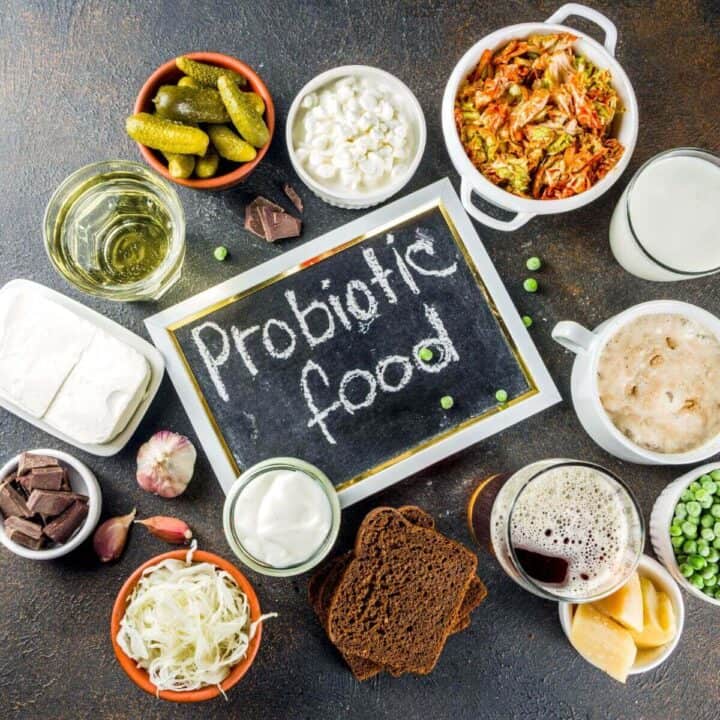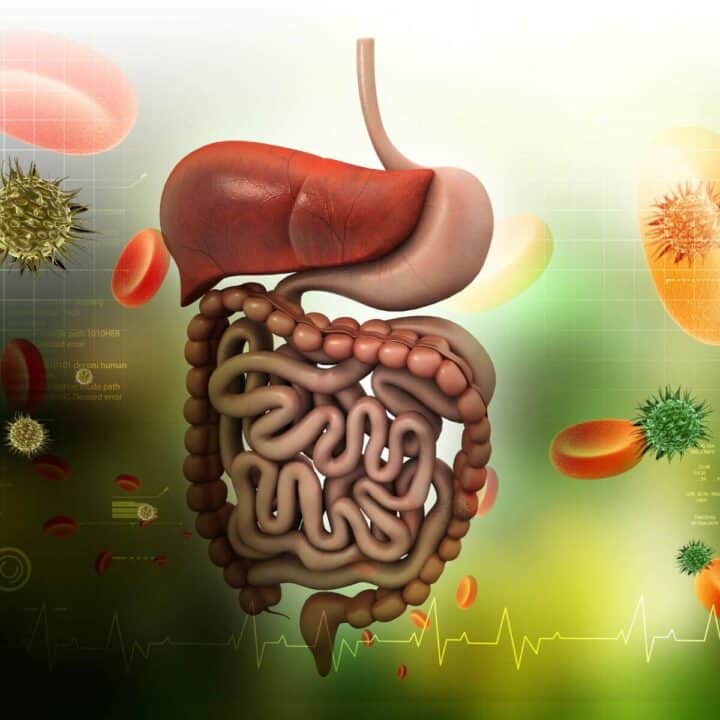Digestive issues may not always be visible to others, but their impact on daily life can be profound. In this article, you will find the key things to focus on to improve digestion and maintain optimal digestion throughout your life. These natural digestion remedies help digestion and are the simple steps toward a healthier gut.

Table of Contents
Have you ever wished you could explain to your loved ones how it feels to navigate life with persistent gut symptoms? Digestive discomfort can be both physically and emotionally exhausting. As a nutritionist, I hear these sentiments regularly from my clients, but they often struggle to fully convey their experiences to friends and family.

🦠 Gut Symptoms Can Be Emotionally Challenging
Here are four common emotions clients wish their loved ones understood about living with gut symptoms.
1. It's Not Always Visible
"Gut symptoms often involve internal discomfort, and the severity of the issue may not be evident from the outside. Just because I may not 'look' sick doesn't mean I'm not experiencing real and sometimes debilitating symptoms."
The hidden nature of digestive problems can lead to misunderstandings, especially when others expect you to function at your best. Whether it's bloating, pain, or chronic irregularity, the lack of external symptoms can make it easy for others to dismiss or underestimate the impact.
2. It's Emotionally Draining
"Dealing with gut symptoms can be emotionally taxing. The unpredictability of flare-ups, the constant concern about food choices, and the impact on daily life can lead to anxiety and frustration. Your understanding and support mean a lot during these challenging times."
The mental toll that accompanies physical symptoms is significant. The ongoing battle to predict and avoid potential triggers can result in heightened anxiety, making it difficult to relax or enjoy spontaneous activities.
This emotional exhaustion is often compounded by the perception that gut issues are less "serious" than other health problems.

3. Everyday Activities Can Be Challenging
"Simple activities like going out for a meal or attending social events can become sources of stress when dealing with gut symptoms. I may need to carefully plan my day or make adjustments, and your flexibility and empathy in these situations are incredibly valuable."
The digestive system is closely tied to how we socialize, as eating is often a key component of gatherings and celebrations. For someone with gut issues, navigating these events can feel like walking a tightrope, leading to feelings of isolation or frustration when others don't understand their caution or hesitancy.
4. It's a Journey, Not a Quick Fix
"Managing gut symptoms often requires a combination of patience, trial and error, and ongoing efforts. There may not be a quick solution, and your understanding as I navigate this journey is crucial. Your support in seeking and implementing strategies for long-term gut health is immensely appreciated."
Digestive health is not something that improves overnight. Finding the right combination of diet, lifestyle adjustments, and sometimes medical interventions takes time. The path to gut health is often paved with setbacks and experimentation, but it can also be incredibly rewarding.
If you relate to any of these sentiments, take heart in knowing that the challenges you face are not obstacles, but stepping stones toward a healthier, more vibrant life. While your loved ones may not fully grasp the intricacies of your experience, they can witness the transformation that unfolds when you find what works for you.
Daily Habits & Natural Remedies for Optimal Digestion
Optimal gut health isn't achieved through a quick-fix diet or a temporary change in lifestyle. It's about consistently implementing small, intentional habits every day that nurture your digestive system and overall health. Here are the top daily habits to support optimal digestion.
These natural digestion remedies and tips are the key to optimal digestion.
1. Hydrate First Thing in the Morning
Your digestive system needs to be well-hydrated to function optimally, and the best time to start hydrating is first thing in the morning.
Begin your day with a glass of room-temperature water with a squeeze of fresh lemon. Lemon water helps to stimulate digestion, promote hydration, and balance pH levels. By starting your day with water, you also support your body in flushing out toxins that accumulate overnight.

2. Probiotics: Feed Your Gut
A healthy gut microbiome plays a pivotal role in digestion, and one of the easiest ways to support it is by consuming probiotics. Probiotics are beneficial bacteria that help maintain gut balance. You can introduce probiotics into your daily routine through foods like yogurt, kefir, sauerkraut, kimchi, and kombucha, or through probiotic supplements.
A diverse microbiome helps break down food, supports nutrient absorption, and keeps the gut lining strong and healthy. This natural remedy for digestion is an easy one to implement into your everyday routine.
3. Mindful Eating: Slow Down and Savor
In today's fast-paced world, we often eat on the go or while multitasking, which can hinder digestion. Practicing mindful eating means being present and paying attention to your food - how it smells, tastes, and feels.
Take the time to chew each bite thoroughly, as proper chewing is a crucial first step in the digestive process. Eating slowly allows your body to release digestive enzymes and prevents overeating, which can cause bloating or discomfort.
4. Follow a Balanced Diet To Improve Digestion
A diet rich in whole foods - fruits, vegetables, whole grains, lean proteins, and healthy fats - gives your digestive system the fuel it needs to function properly. Fiber is particularly important for digestion, as it promotes healthy bowel movements and prevents constipation.
Incorporate soluble fiber from foods like oats, beans, and apples to help regulate blood sugar, and insoluble fiber from foods like whole grains and leafy greens to add bulk to your stool and keep things moving smoothly.

5. Light Activity After Meals To Help Digestion
After eating, engage in light physical activity, such as a short, leisurely walk. Walking encourages the movement of food through the digestive tract, reducing the risk of bloating and indigestion.
However, avoid intense physical activity immediately after eating, as it can divert blood away from the digestive organs and impair the digestive process.
6. Avoid Lying Down After Meals
It can be tempting to take a nap after a big meal, but lying down right after eating increases the risk of acid reflux and heartburn. Try to remain upright for at least 2-3 hours after eating to allow your stomach to digest properly.
📥 GET THIS RECIPE IN YOUR INBOX 📥
If you feel tired, consider reclining in a more upright position or engaging in light activities, like reading or walking, instead.
7. Herbal Tea Before Bed
To promote relaxation and support digestion, consider incorporating a calming herbal tea into your nightly routine. Chamomile, ginger, and peppermint teas have natural digestive benefits and can soothe the stomach before bed.
Chamomile, in particular, helps reduce inflammation and relax the muscles in your digestive tract, making it an ideal pre-sleep beverage.
8. Manage Stress
The gut and brain are intimately connected through the gut-brain axis, meaning your digestive system is highly sensitive to emotional stress. Chronic stress can lead to issues like indigestion, bloating, and irritable bowel syndrome (IBS).
Incorporating daily stress-management techniques, such as deep breathing, meditation, yoga, or even journaling, can significantly improve gut health. A calm mind leads to a calm gut.

9. Exercise Regularly
Physical activity is essential not only for maintaining a healthy body weight, but also for supporting and improving digestion. Regular exercise improves gut motility, helping food move through the digestive tract more efficiently.
It also stimulates the growth of beneficial gut bacteria. Incorporate a dedicated exercise session into your daily routine, whether it's a jog, swim, bike ride, or strength training workout. Aim for at least 30 minutes of moderate activity per day.
10. Chew Your Food Thoroughly
Chewing is the first step of digestion, and it's often overlooked. When you chew your food well, you break it down into smaller pieces, making it easier for your stomach to digest.
Saliva, which contains digestive enzymes, begins breaking down carbohydrates while you chew. Thorough chewing not only aids digestion but also allows you to slow down and enjoy your meal, helping to prevent overeating.
11. Incorporate Fermented Foods
In addition to taking probiotics, fermented foods like sauerkraut, kimchi, miso, and tempeh provide your gut with beneficial bacteria. These foods also contain enzymes that aid digestion and improve nutrient absorption.
Regular consumption of fermented foods can help maintain a healthy balance of gut flora and support immune function. This is one of my favorite natural remedies for better digestion. Simply adding in more fermented foods can have a huge impact on improving your overall digestion.
12. Eat Smaller, More Frequent Meals
Large meals can overwhelm your digestive system, leading to discomfort and sluggish digestion. Consider eating smaller, more frequent meals throughout the day to keep your metabolism steady and your digestive system from getting overworked.
This habit is especially beneficial for those prone to acid reflux or bloating, and helps improve your digestion.
13. Get Enough Sleep
Sleep is essential for overall health, including improving digestion. During sleep, your body repairs and regenerates, including your digestive organs.
Poor sleep can disrupt digestion, slow down metabolism, and increase stress hormones, leading to digestive issues like constipation and bloating. Aim for 7-9 hours of quality sleep each night to allow your digestive system to rest and reset.
14. Listen to Your Body
Your body is constantly giving you signals about what it needs and how it's feeling. Pay attention to these cues, especially when it comes to food and digestion. If a particular food causes discomfort or doesn't sit well, it might be worth eliminating it from your diet temporarily to see if symptoms improve.
Likewise, if you feel full, resist the urge to continue eating out of habit. Your body knows what it needs to maintain balance.
15. Seek Professional Support
If you're struggling with persistent gut health issues, don't hesitate to seek the support of a nutritionist or healthcare professional. They can help you identify food sensitivities, underlying conditions, or lifestyle changes that may improve your digestion.
Gut health is highly individualized, and sometimes professional guidance is key to finding the right balance for your body and help with your digestion.

🪜 Optimal Digestion Is Achieved Through Simple Daily Steps
Supporting optimal digestion isn't about making drastic changes overnight, but rather adopting small, sustainable habits that promote long-term gut health. From hydration and mindful eating to managing stress and getting enough sleep, each of these daily practices contributes to a healthier digestive system.
Remember, improving your digestion is a journey, not a sprint, and every small step brings you closer to better health.
If you're looking for support and guidance to address your gut health, consider joining the Restore Your Gut Health Fundamentals Program to explore strategies designed to kick your gut health problems to the curb. With the right habits in place, you can transform your digestive health and enhance your overall well-being.

Let's Discuss How to Achieve Optimal Digestion
So, have you tried any of these dietary and lifestyle changes that set you up to achieve optimal digestion? Do you need help with your digestion issues and want to try out nutrition and lifestyle changes, including natural remedies, for better digestion? Let me know your personal experience below?
You can also connect with me @EatYourNutrition on Instagram. I love seeing your photos. #EatYourNutrition #LauraVillanueva
Additional Resources
Also, for further reading and guidance on how to support your gut health with foods high in butyrate, check out some of my resources below.
Suspect you have a gut imbalance or simply want to improve your gut and hormone health. Download my guide, 10 Simple Ways To Support Your Gut Health Naturally
- Program: Join my Restore Your Gut Health Fundamentals Program. Register today.

- Meal Plan: Want a simple recipe guide and gut healthy meal plan packed with the key to help get your gut health back on track? Order this meal plan and recipes inside the Gut Health Reset Meal Plan.
- Group Support: Join my Featured Nutrition Challenge. All seasonal nutrition challenges come with a meal plan, recipe guide, grocery shopping list, and a seasonal featured nutrition theme.





















Comments
No Comments